- Home
- Christopher Moore
Lamb: The Gospel According to Biff, Christ’s Childhood Pal Page 2
Lamb: The Gospel According to Biff, Christ’s Childhood Pal Read online
Page 2
The angel has confided in me that he is going to ask the Lord if he can become Spider-Man. He watches the television constantly, even when I sleep, and he has become obsessed with the story of the hero who fights demons from the rooftops. The angel says that evil looms larger now than it did in my time, and that calls for greater heroes. The children need heroes, he says. I think he just wants to swing from buildings in tight red jammies.
What hero could touch these children anyway, with their machines and medicine and distances made invisible? (Raziel: not here a week and he would trade the Sword of God to be a web slinger.) In my time, our heroes were few, but they were real—some of us could even trace our kinship to them. Joshua always played the heroes—David, Joshua, Moses—while I played the evil ones: Pharaoh, Ahab, and Nebuchadnezzar. If I had a shekel for every time I was slain as a Philistine, well, I’d not be riding a camel through the eye of a needle anytime soon, I’ll tell you that. As I think back, I see that Joshua was practicing for what he would become.
“Let my people go,” said Joshua, as Moses.
“Okay.”
“You can’t just say, ‘Okay.’”
“I can’t?”
“No, the Lord has hardened your heart against my demands.”
“Why’d he do that?”
“I don’t know, he just did. Now, let my people go.”
“Nope.” I crossed my arms and turned away like someone whose heart is hardened.
“Behold as I turn this stick into a snake. Now, let my people go!”
“Okay.”
“You can’t just say ‘okay’!”
“Why? That was a pretty good trick with the stick.”
“But that’s not how it goes.”
“Okay. No way, Moses, your people have to stay.”
Joshua waved his staff in my face. “Behold, I will plague you with frogs. They will fill your house and your bedchamber and get on your stuff.”
“So?”
“So that’s bad. Let my people go, Pharaoh.”
“I sorta like frogs.”
“Dead frogs,” Moses threatened. “Piles of steaming, stinking dead frogs.”
“Oh, in that case, you’d better take your people and go. I have some sphinxes and stuff to build anyway.”
“Dammit, Biff, that’s not how it goes! I have more plagues for you.”
“I want to be Moses.”
“You can’t.”
“Why not?”
“I have the stick.”
“Oh.”
And so it went. I’m not sure I took to playing the villains as easily as Joshua took to being the heroes. Sometimes we recruited our little brothers to play the more loathsome parts. Joshua’s little brothers Judah and James played whole populations, like the Sodomites outside of Lot’s door.
“Send out those two angels so that we can know them.”
“I won’t do that,” I said, playing Lot (a good guy only because Joshua wanted to play the angels), “but I have two daughters who don’t know anyone, you can meet them.”
“Okay,” said Judah.
I threw open the door and led my imaginary daughters outside so they could know the Sodomites…
“Pleased to meet you.”
“Charmed, I’m sure.”
“Nice to meet you.”
“THAT’S NOT HOW IT GOES!” Joshua shouted. “You’re supposed to try to break the door down, then I will smite you blind.”
“Then you destroy our city?” James said.
“Yes.”
“We’d rather meet Lot’s daughters.”
“Let my people go,” said Judah, who was only four and often got his stories confused. He particularly liked the Exodus because he and James got to throw jars of water on me as I led my soldiers across the Red Sea after Moses.
“That’s it,” Joshua said. “Judah, you’re Lot’s wife. Go stand over there.”
Sometimes Judah had to play Lot’s wife no matter what story we were doing. “I don’t want to be Lot’s wife.”
“Be quiet, pillars of salt can’t talk.”
“I don’t want to be a girl.”
Our brothers always played the female parts. I had no sisters to torment, and Joshua’s only sister at the time, Elizabeth, was still a baby. That was before we met the Magdalene. The Magdalene changed everything.
After I overheard my parents talking about Joshua’s mother’s madness, I often watched her, looking for signs, but she seemed to go about her duties like all the other mothers, tending to the little ones, working in the garden, fetching water, and preparing food. There was no sign of going about on all fours or foaming at the mouth as I had expected. She was younger than many of the mothers, and much younger than her husband, Joseph, who was an old man by the standards of our time. Joshua said that Joseph wasn’t his real father, but he wouldn’t say who his father was. When the subject came up, and Mary was in earshot, she would call to Josh, then put her finger to her lips to signal silence.
“Now is not the time, Joshua. Biff would not understand.”
Just hearing her say my name made my heart leap. Early on I developed a little-boy love for Joshua’s mother that sent me into fantasies of marriage and family and future.
“Your father is old, huh, Josh?”
“Not too old.”
“When he dies, will your mother marry his brother?”
“My father has no brothers. Why?”
“No reason. What would you think if your father was shorter than you?”
“He isn’t.”
“But when your father dies, your mother could marry someone shorter than you, and he would be your father. You would have to do what he says.”
“My father will never die. He is eternal.”
“So you say. But I think that when I’m a man, and your father dies, I will take your mother as my wife.”
Joshua made a face now as if he had bitten into an unripe fig. “Don’t say that, Biff.”
“I don’t mind that she’s mad. I like her blue cloak. And her smile. I’ll be a good father, I’ll teach you how to be a stonemason, and I’ll only beat you when you are a snot.”
“I would rather play with lepers than listen to this.” Joshua began to walk away.
“Wait. Be nice to your father, Joshua bar Biff”—my own father used my full name like this when he was trying to make a point—“Is it not the word of Moses that you must honor me?”
Little Joshua spun on his heel. “My name is not Joshua bar Biff, and it is not Joshua bar Joseph either. It’s Joshua bar Jehovah!”
I looked around, hoping that no one had heard him. I didn’t want my only son (I planned to sell Judah and James into slavery) to be stoned to death for uttering the name of God in vain. “Don’t say that again, Josh. I won’t marry your mother.”
“No, you won’t.”
“I’m sorry.”
“I forgive you.”
“She will make an excellent concubine.”
Don’t let anyone tell you that the Prince of Peace never struck anyone. In those early days, before he had become who he would be, Joshua smote me in the nose more than once. That was the first time.
Mary would stay my one true love until I saw the Magdalene.
If the people of Nazareth thought Joshua’s mother was mad, there was little said of it out of respect for her husband, Joseph. He was wise in the Law, the Prophets, and the Psalms, and there were few wives in Nazareth who didn’t serve supper in one of his smooth olive-wood bowls. He was fair, strong, and wise. People said that he had once been an Essene, one of the dour, ascetic Jews who kept to themselves and never married or cut their hair, but he did not congregate with them, and unlike them, he still had the ability to smile.
In those early years, I saw him very little, as he was always in Sepphoris, building structures for the Romans and the Greeks and the landed Jews of that city, but every year, as the Feast of Firsts approached, Joseph would stop his work in the fortress city and stay home car
ving bowls and spoons to give to the Temple. During the Feast of Firsts, it was the tradition to give first lambs, first grain, and first fruits to the priests of the Temple. Even first sons born during the year were dedicated to the Temple, either by promising them for labor when they were older, or by a gift of money. Craftsmen like my father and Joseph could give things that they made, and in some years my father fashioned mortars and pestles or grinding stones for the tribute, while in others he gave tithes of coin. Some people made the pilgrimage to Jerusalem for this feast, but since it fell only seven weeks after Passover, many families could not afford to make the pilgrimage, and the gifts went to our simple village synagogue.
During the weeks leading up to the feast, Joseph sat outside of his house in the shade of an awning he had made, worrying the gnarled olive wood with adze and chisel, while Joshua and I played at his feet. He wore the single-piece tunic that we all wore, a rectangle of fabric with neck hole in the middle, belted with a sash so that the sleeves fell to the elbows and the hem fell to the knees.
“Perhaps this year I should give the Temple my first son, eh, Joshua? Wouldn’t you like to clean the altar after the sacrifices?” He grinned to himself without looking up from his work. “I owe them a first son, you know. We were in Egypt at the Firsts Feast when you were born.”
The idea of coming in contact with blood clearly terrified Joshua, as it would any Jewish boy. “Give them James, Abba, he is your first son.”
Joseph shot a glance my way, to see if I had reacted. I had, but it was because I was considering my own status as a first son, hoping that my father wasn’t thinking along the same lines. “James is a second son. The priests don’t want second sons. It will have to be you.”
Joshua looked at me before he answered, then back at his father. Then he smiled. “But Abba, if you should die, who will take care of Mother if I am at the Temple?”
“Someone will look after her,” I said. “I’m sure of it.”
“I will not die for a long time.” Joseph tugged at his gray beard. “My beard goes white, but there’s a lot of life in me yet.”
“Don’t be so sure, Abba,” Joshua said.
Joseph dropped the bowl he was working on and stared into his hands. “Run along and play, you two,” he said, his voice little more than a whisper.
Joshua stood and walked away. I wanted to throw my arms around the old man, for I had never seen a grown man afraid before and it frightened me too. “Can I help?” I said, pointing to the half-finished bowl that lay in Joseph’s lap.
“You go with Joshua. He needs a friend to teach him to be human. Then I can teach him to be a man.”
Chapter 2
The angel wants me to convey more of Joshua’s grace. Grace? I’m trying to write about a six-year-old, for Christ’s sakes, how much grace could he have? It’s not like Joshua walked around professing that he was the Son of God every day of the week. He was a pretty normal kid, for the most part. There was the trick he did with the lizards, and once we found a dead meadowlark and he brought it back to life, and there was the time, when we were eight, when he healed his brother Judah’s fractured skull after a game of “stone the adulteress” got out of hand. (Judah could never get the knack of being an adulteress. He’d stand there stiff as Lot’s wife. You can’t do that. An adulteress has to be wily and nimble-footed.) The miracles Joshua performed were small and quiet, as miracles tend to be, once you get used to them. But trouble came from the miracles that happened around him, without his volition, as it were. Bread and serpents come to mind.
It was a few days before the Passover feast, and many of the families of Nazareth were not making the pilgrimage to Jerusalem that year. There had been little rain through our winter season, so it was going to be a hard year. Many farmers could not afford the time away from their fields to travel to and from the holy city. My father and Joshua’s were both working in Sepphoris, and the Romans wouldn’t give them time off work beyond the actual feast days. My mother had been making the unleavened bread when I came in from playing in the square.
She held a dozen sheets of the flatbread before her and she looked as if she was going to dash it to the floor any second. “Biff, where is your friend Joshua?” My little brothers grinned at me from behind her skirts.
“At home, I suppose. I just left him.”
“What have you boys been doing?”
“Nothing.” I tried to remember if I had done anything that should make her this angry, but nothing came to mind. It was a rare day and I’d made no trouble. Both my little brothers were unscathed as far as I knew.
“What have you done to cause this?” She held out a sheet of the flatbread, and there, in crispy brown relief on the golden crust, was the image of my friend Joshua’s face. She snatched up another sheet of bread, and there, again, was my friend Josh. Graven images—big sin. Josh was smiling. Mother frowned on smiling. “Well? Do I need to go to Joshua’s house and ask his poor, insane mother?”
“I did this. I put Joshua’s face on the bread.” I just hoped that she didn’t ask me how I had done it.
“Your father will punish you when he comes home this evening. Now go, get out of here.”
I could hear my little brother’s giggling as I slunk out the door, but once outside, things worsened. Women were coming away from their baking stones, and each held a sheet of unleavened bread, and each was muttering some variation of “Hey, there’s a kid on my bread.”
I ran to Joshua’s house and stormed in without knocking. Joshua and his brothers were at the table eating. Mary was nursing Joshua’s newest little sister, Miriam.
“You are in big trouble,” I whispered in Josh’s ear with enough force to blow out an eardrum.
Joshua held up the flatbread he was eating and grinned, just like the face on his bread. “It’s a miracle.”
“Tastes good too,” said James, crunching a corner off of his brother’s head.
“It’s all over town, Joshua. Not just your house. Everyone’s bread has your face on it.”
“He is truly the Son of God,” Mary said with a beatific smile.
“Oh, jeez, Mother,” James said.
“Yeah, jeez Mom,” said Judah.
“His mug is all over the Passover feast. We have to do something.” They didn’t seem to get the gravity of the situation. I was already in trouble, and my mother didn’t even suspect anything supernatural. “We have to cut your hair.”
“What?”
“We cannot cut his hair,” Mary said. She had always let Joshua wear his hair long, like an Essene, saying that he was a Nazarite like Samson. It was just another reason why many of the townspeople thought her mad. The rest of us wore our hair cut short, like the Greeks who had ruled our country since the time of Alexander, and the Romans after them.
“If we cut his hair he looks like the rest of us. We can say it’s someone else on the bread.”
“Moses,” Mary said. “Young Moses.”
“Yes!”
“I’ll get a knife.”
“James, Judah, come with me,” I said. “We have to tell the town that the face of Moses has come to visit us for the Passover feast.”
Mary pulled Miriam from her breast, bent, and kissed me on the forehead. “You are a good friend, Biff.”
I almost melted in my sandals, but I caught Joshua frowning at me. “It’s not the truth,” he said.
“It will keep the Pharisees from judging you.”
“I’m not afraid of them,” said the nine-year-old. “I didn’t do this to the bread.”
“Then why take the blame and the punishment for it?”
“I don’t know, seems like I should, doesn’t it?”
“Sit still so your mother can cut your hair.” I dashed out the door, Judah and James on my heels, the three of us bleating like spring lambs.
“Behold! Moses has put his face on the bread for Passover! Behold!”
Miracles. She kissed me. Holy Moses on a matzo! She kissed me.
&nb
sp; The miracle of the serpent? It was an omen, in a way, although I can only say that because of what happened between Joshua and the Pharisees later on. At the time, Joshua thought it was the fulfillment of a prophecy, or that’s how we tried to sell it to his mother and father.
It was late summer and we were playing in a wheat field outside of town when Joshua found the nest of vipers.
“A nest of vipers,” Joshua shouted. The wheat was so tall I couldn’t see where he was calling from.
“A pox on your family,” I replied.
“No, there’s a nest of vipers over here. Really.”
“Oh, I thought you were taunting me. Sorry, a pox off of your family.”
“Come, see.”
I crashed through the wheat to find Joshua standing by a pile of stones a farmer had used to mark the boundary of his field. I screamed and backpedaled so quickly that I lost my balance and fell. A knot of snakes writhed at Joshua’s feet, skating over his sandals and wrapping themselves around his ankles. “Joshua, get away from there.”
“They won’t hurt me. It says so in Isaiah.”
“Just in case they haven’t read the Prophets…”
Joshua stepped aside, sending the snakes scattering, and there, behind him, was the biggest cobra I had ever seen. It reared up until it was taller than my friend, spreading a hood like a cloak.
“Run, Joshua.”
He smiled. “I’m going to call her Sarah, after Abraham’s wife. These are her children.”
“No kidding? Say good-bye now, Josh.”
“I want to show Mother. She loves prophecy.” With that, he was off toward the village, the giant serpent following him like a shadow. The baby snakes stayed in the nest and I backed slowly away before running after my friend.
I once brought a frog home, hoping to keep him as a pet. Not a large frog, a one-handed frog, quiet and well mannered. My mother made me release him, then cleanse myself in the immersion pool (the mikveh) at the synagogue. Still she wouldn’t let me in the house until after sunset because I was unclean. Joshua led a fourteen-foot-long cobra into his house and his mother squealed with joy. My mother never squealed.

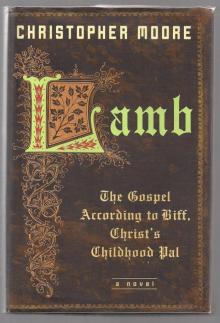 Lamb: The Gospel According to Biff, Christs Childhood Pal
Lamb: The Gospel According to Biff, Christs Childhood Pal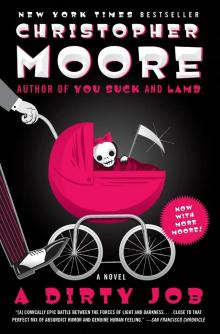 A Dirty Job
A Dirty Job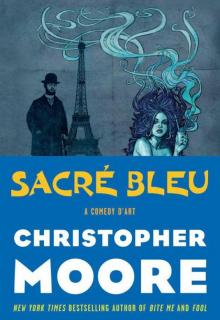 Sacré Bleu
Sacré Bleu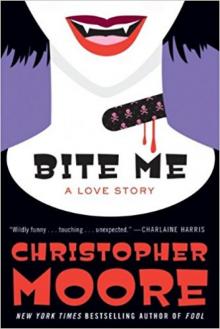 Bite Me: A Love Story
Bite Me: A Love Story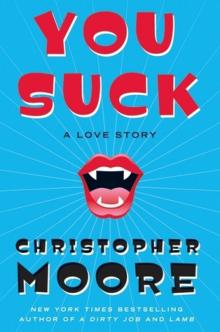 You Suck: A Love Story
You Suck: A Love Story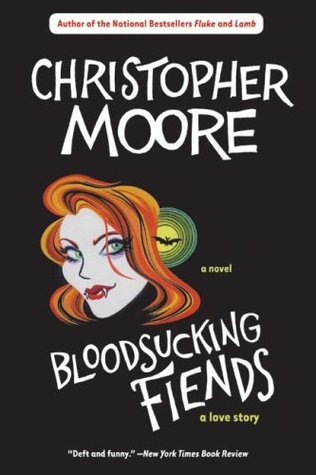 Bloodsucking Fiends: A Love Story
Bloodsucking Fiends: A Love Story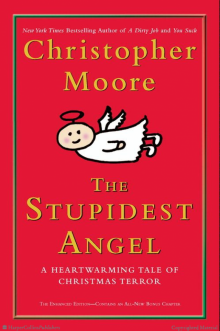 The Stupidest Angel
The Stupidest Angel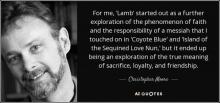 Coyote Blue
Coyote Blue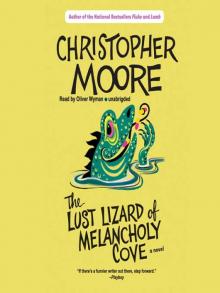 The Lust Lizard of Melancholy Cove
The Lust Lizard of Melancholy Cove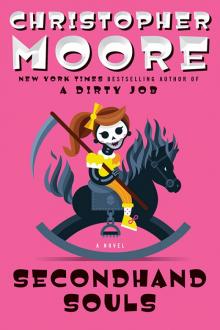 Secondhand Souls
Secondhand Souls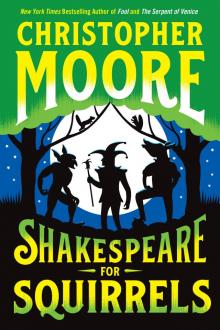 Shakespeare for Squirrels
Shakespeare for Squirrels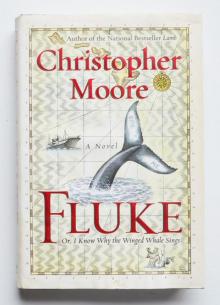 Fluke, or, I Know Why the Winged Whale Sings
Fluke, or, I Know Why the Winged Whale Sings Island of the Sequined Love Nun
Island of the Sequined Love Nun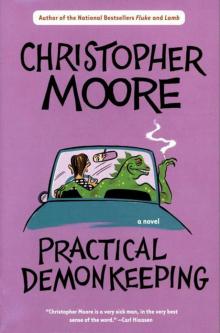 Practical Demonkeeping
Practical Demonkeeping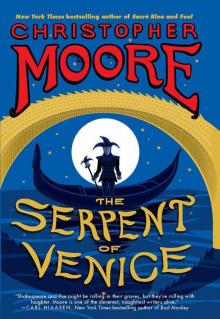 The Serpent of Venice
The Serpent of Venice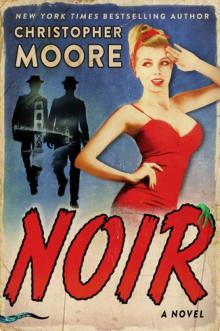 Noir
Noir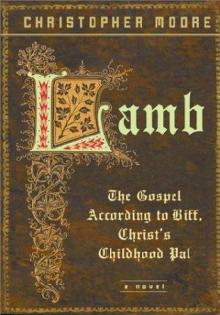 Lamb: The Gospel According to Biff, Christ’s Childhood Pal
Lamb: The Gospel According to Biff, Christ’s Childhood Pal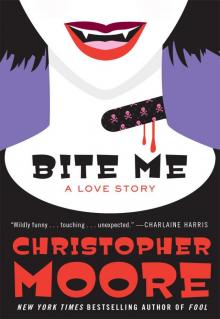 Bite Me
Bite Me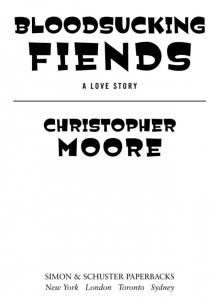 Bloodsucking Fiends
Bloodsucking Fiends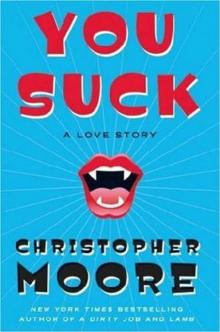 You Suck ls-2
You Suck ls-2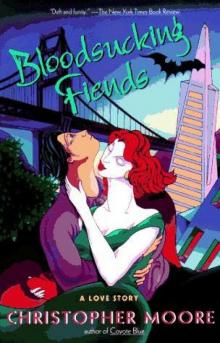 Bloodsucking Fiends ls-1
Bloodsucking Fiends ls-1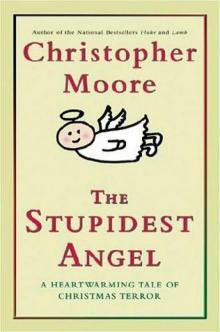 The Stupidest Angel: A Heartwarming Tale of Christmas Terror
The Stupidest Angel: A Heartwarming Tale of Christmas Terror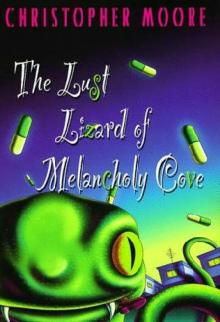 The Lust Lizard of Melancholy Cove pc-2
The Lust Lizard of Melancholy Cove pc-2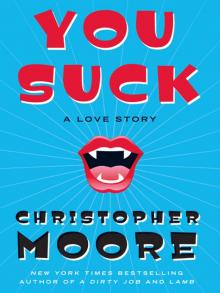 You Suck
You Suck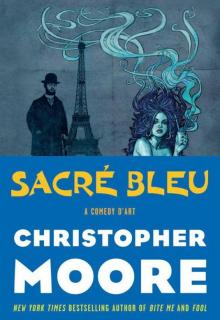 Sacre Bleu: A Comedy d'Art
Sacre Bleu: A Comedy d'Art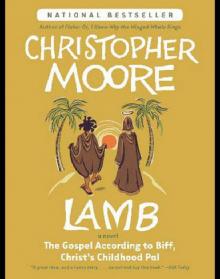 Lamb
Lamb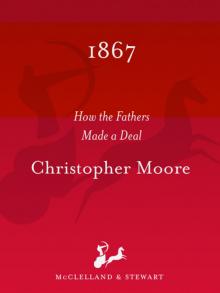 1867
1867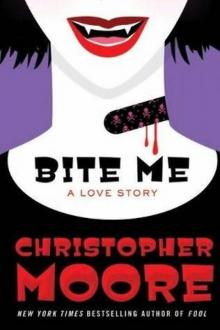 Bite Me ls-3
Bite Me ls-3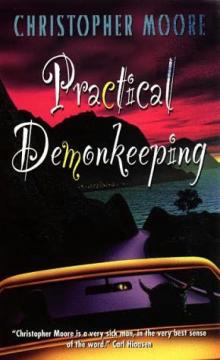 Practical Demonkeeping pc-1
Practical Demonkeeping pc-1